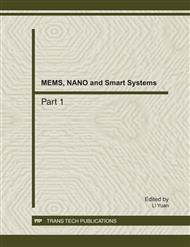[1]
D.H., Owens, Iterative learning control- An optimization paradigm, Annual reviews in control 29, 2005, pp.57-70.
DOI: 10.1016/j.arcontrol.2005.01.003
Google Scholar
[2]
HS Ahn, YQ Chen, KL Moore, Iterative learning control: brief survey and categorization, IEEE TRANSACTIONS ON SYSTEMS, MAN, AND CYBERNETICS—PART C: APPLICATIONS AND REVIEWS, VOL. 37, NO. 6, NOVEMBER 2007, pp.1099-1121.
DOI: 10.1109/tsmcc.2007.905759
Google Scholar
[3]
S Arimoto, S Kawamura, F Miyazaki, Bettering operation of robots by learning, J Robotic Syst, vol. 1, no. 2, 1984, p.123–40.
DOI: 10.1002/rob.4620010203
Google Scholar
[4]
R. Horowitz, Learning control of robot manipulators, J Dynam Syst Measur Control, vol. 115, 1993, p.402–11.
Google Scholar
[5]
N Amann, DH Owens, E Rogers, Iterative learning control for discrete time systems with exponential rate of convergence, Technical Report 95/14, Centre for Systems and Control Engineering, University of Exeter, (1995).
DOI: 10.1049/ip-cta:19960244
Google Scholar
[6]
N Amann, DH Owens, E Rogers, Iterative learning control using optimal feedback and feedforward actions, International Journal of control, vol. 65, 1996, pp.277-293.
DOI: 10.1080/00207179608921697
Google Scholar
[7]
M.Z. Md Zain, M.O. Tokhi, Z. Mohamed, Hybrid learning control schemes with input shaping of a flexible manipulator system, Mechatronics vol. 16, 2006, p.209–219.
DOI: 10.1016/j.mechatronics.2005.11.004
Google Scholar
[8]
Aiping Wang, Puya Afshar, Hong Wang, Complex stochastic systems modelling and control via iterative machine learning, Neurocomputing vol. 71, 2008, p.2685– 2692.
DOI: 10.1016/j.neucom.2007.06.018
Google Scholar
[9]
W.F. Cheung, Y.S. Hung Jacob, Robust learning control of a high precision planar parallel manipulator, Mechatronics, vol 19, 2009, p.42–55.
DOI: 10.1016/j.mechatronics.2008.07.002
Google Scholar
[10]
D. H. OWENS, S. DALEY, ITERATIVE LEARNING CONTROL— MONOTONICITY AND OPTIMIZATION", Int. J. Appl. Math. Comput. Sci., Vol. 18, No. 3, 2008, p.279–293.
Google Scholar
[11]
V. Hatzikos, J. Hätönen, D.H. Owens Genetic algorithms in norm-optimal linear and non-linear I terative learning control. International Journal of control, vol 77, 2004: 188-197.
DOI: 10.1080/00207170310001649351
Google Scholar
[12]
Z. Michalewicz, Genetic Algorithms + Data Structures=Evolution Programs, second, extended edition, Springer-Verlag, (1994).
Google Scholar
[13]
X.L. Wen., A.G. Song, An improved genetic algorithm for plannar straightness and spatial straightness error evaluation, International Journal of Machine Tools and Manufacture, Vol 11, 2003, pp.1077-1084.
DOI: 10.1016/s0890-6955(03)00105-6
Google Scholar
[14]
J Kennedy, R Eberhart, Particle swarm optimization, , In Proc. IEEE Int. Conf. Neural Networks, vol. 4, 1995, p.1942-(1948).
Google Scholar
[15]
R Eberhart, Y Shi, J Kennedy, Swarm Intelligence, San Mateo, Ca: Morgan Kaufmann, (2001).
Google Scholar
[16]
R.C. Eberhart, Y Shi, Comparison between genetic algorithms and particle swarm optimization, Proc. 7th Conf. Evol. Program, vol. 1447, 2008, pp.611-616.
Google Scholar
[17]
YD Valle, GK Venayagamoorthy, Particle swarm optimization: Basic concepts, variants and applications in power systems, IEEE Trans. On Evolutionary Computation vol. 12, 2008, pp.171-195.
DOI: 10.1109/tevc.2007.896686
Google Scholar
[18]
DJ Krusienski, WK Kenkins, Particle swarm optimization for adaptive IIR filter structures, In Proc. Cong. Evolutionary Computation, 2004, pp.965-970.
DOI: 10.1109/cec.2004.1330966
Google Scholar
[19]
R Eberhart, Y Shi, Comparing inertia weights and constriction factors in particle swarm optimization, In Proc. Cong. Evolutionary Computation, 2000, pp.84-88.
DOI: 10.1109/cec.2000.870279
Google Scholar
[20]
M. Clerc, J. Kennedy, The particle swarm—explosion, stability, and convergence in a multidimensional complex space, Evolutionary Computation, vol. 6, 2002, pp.58-73.
DOI: 10.1109/4235.985692
Google Scholar


